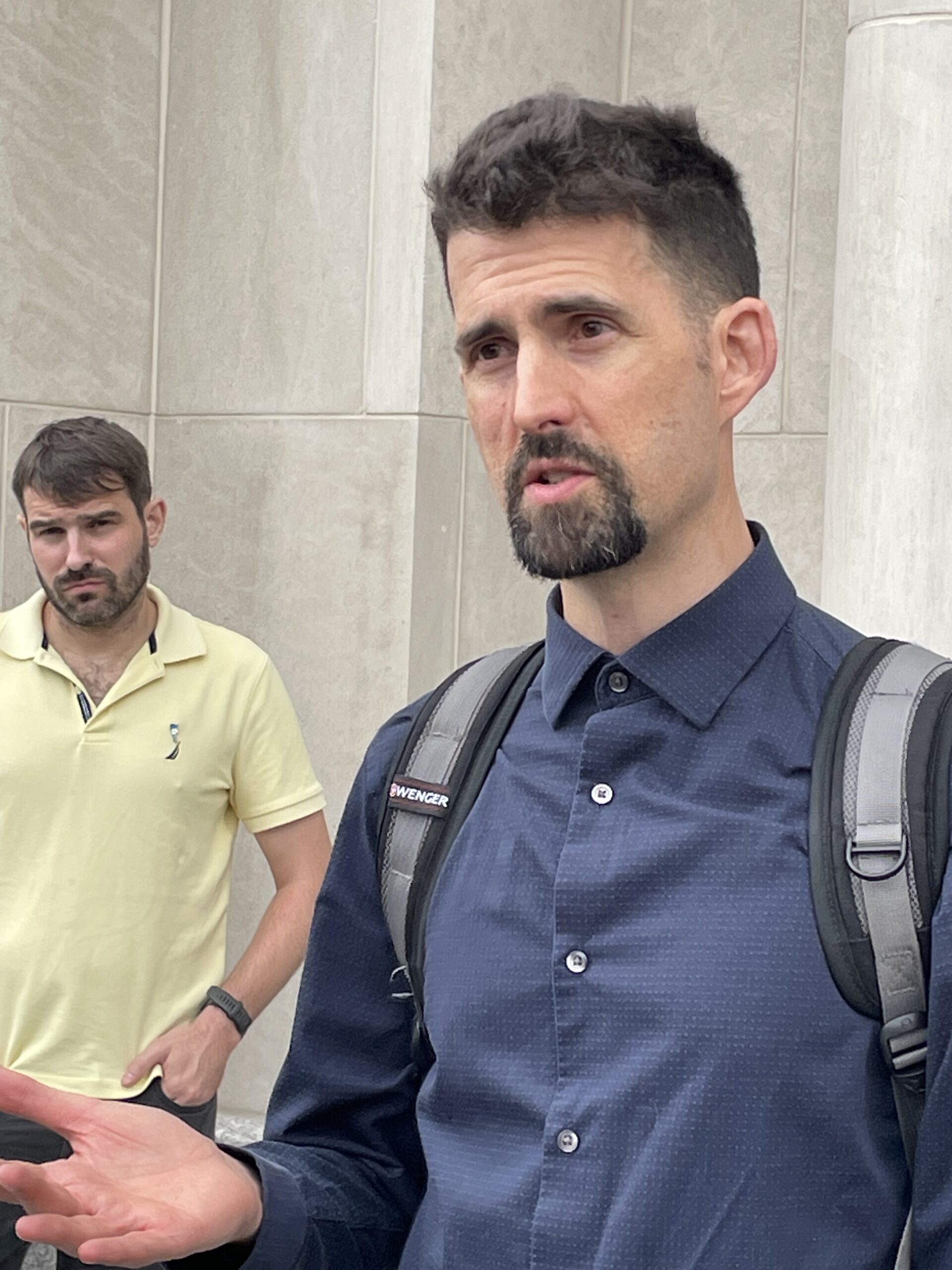Elderly Bitcoin Scam Victims Delay Freeman Case as Judge Considers Longer Sentence

Free State Project icon Ian Freeman walked into his sentencing hearing in the Warren B. Rudman Courthouse in Concord a hero, but he walked out a couple of hours later labeled a black-souled villain by one of the many alleged victims.
In a courtroom packed with Free Staters, Freeman got two standing ovations at the start of Monday’s proceedings. He had reason to be optimistic as Judge Joseph LaPlante agreed to dismiss one of his money laundering convictions before the hearing started. LaPlante said it was a close call, but there was not sufficient evidence to support the jury’s verdict for that one count.
That was the last positive development for Freeman. Soon, LaPlante decided to hear from some of the women victimized by Freeman’s Bitcoin operations.
“My life, and countless other lives, have been ruined,” Rebecca Viar said.
Freeman is facing years in federal prison, but now thanks to women like Viar, he could face even more. LaPlante halted Monday’s scheduled sentencing hearing in order to consider adding more time to the potential penalty in light of the many elderly women scammed with Freeman’s aid. He’s also considering making Freeman pay up to $3.4 million in restitution.
A jury convicted Freeman in December on charges of operating an unlicensed money-transmitting business, money laundering, conspiracy to commit money laundering, conspiracy to operate an unlicensed money-transmitting business, and income tax evasion.
Freeman argued that he’s a victim of an oppressive government, a martyr for promoting financial liberation from fiat currency. His defense team is still pushing the theory, even after the convictions, claiming the financial laws and regulations used to convict him don’t apply to financial products like Bitcoin and other cryptocurrencies.
But Viar and other women hurt by scammers told a different story. In their version, Freeman was central to the crimes that took advantage of their loneliness, destroyed their finances, stripped them of a secure retirement, and forever took away their trust in other people.
“Ian Freeman was the planner and instigator of this entire scheme,” Viar said.
Viar, an elderly widow, was ripped off by an online romance scammer known as Michael Glenn Wilson. The crook, who has thus far not been charged, used Freeman’s Bitcoin-selling services to facilitate the crimes, according to prosecutors.
In Viar’s case, she emptied her savings account, cashed out her insurance policy, took out loans, and even sold her dead husband’s truck. Rather than send the money directly to Wilson, he conned his alleged victims into buying Bitcoin from Freeman. The Bitcoin was then deposited into a digital wallet Wilson could access.
Karen Miller was planning to retire to Florida with her husband when he died in 2018. Miller still moved to the Sunshine State after her husband’s death, but found herself lonely. She met a man named Jerry Harmon online, and before long she was sending him money.
Miller handed over everything to her online Romeo, to the tune of $300,000. She kept going, too, maxing out credit cards for Harmon. Like Viar, Harmon was instructed to buy Bitcoins directly from Freeman, which Harmon would then access through a digital wallet. Harmon, who has never been caught, even had Miller buying Bitcoin using money from other women. Harmon told her these women were the wives and girlfriends of his employees.
Miller finally stopped when other Harmon victims reached out to her and told her the truth. Now, instead of enjoying her golden years as a Florida retiree, Miller is working at a Publix grocery store.
Freeman’s lawyers, respected criminal defense attorneys Marc Sisti and Richard Guerrero, never considered the women victims in this case. Freeman was caught for failing to adhere to financial and banking regulations. He was never accused of being a scammer.
Prosecutors have argued Freeman either knew, or at best actively worked to not know, he was facilitating crimes with his Bitcoin transactions. Freeman was known throughout the Bitcoin community for charging higher fees than other market operators, and for asking fewer questions, prosecutors have said.
But LaPlante implied Monday Freeman wasn’t merely laundering money for the scammers, he was taking a role in the scam. Freeman was taking money from the victims and then sending it to the criminals.
LaPlante said it is likely he will rule that Freeman needs to pay restitution to the many scam victims who bought Bitcoin from him. LaPlante also said he would adopt a “vulnerable victim adjustment” to the sentencing guidelines, increasing the range of prison time LaPlante could use for his final sentencing order.
After the hearing, Freeman remained upbeat. He’s still confident of ultimate victory in his caase, even if that means going through the appeals process. Getting one of the money laundering charges dismissed is a good sign, he said.
“Being able to challenge these things after the fact is a nice thing,” Freeman said.
As for the victims like Viar and Miller, Freeman said he has no guilt for what happened to them.
“It seems like they’ve been lied to and told I had something to do with these crimes against them, which I didn’t,” Freeman said. “I didn’t have anything more to do with what happened to them than the bank tellers that sent their life savings away. If anything, our procedures were even more in-depth than what the bank tellers were doing.”




